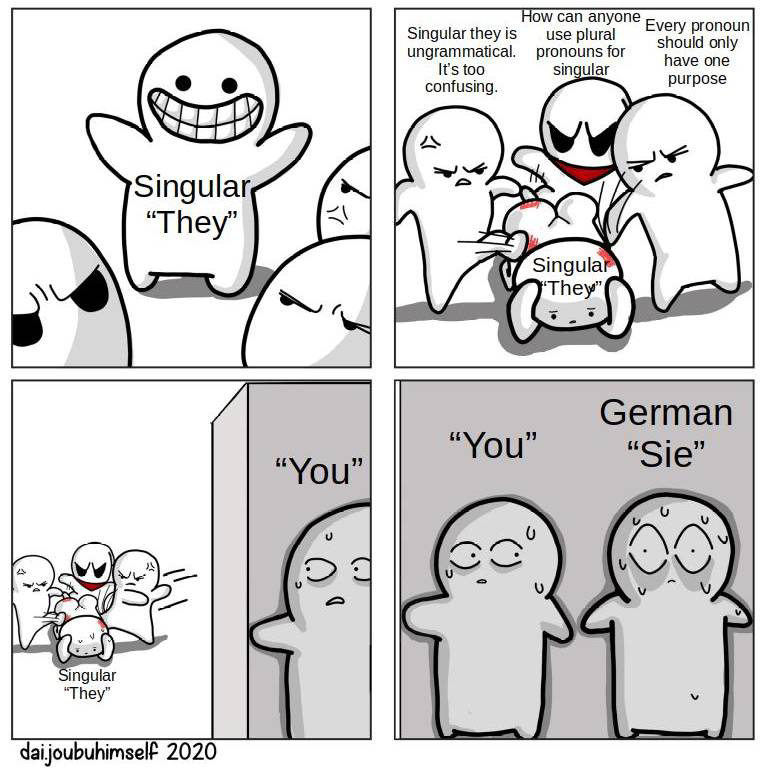this post was submitted on 24 Jul 2023
667 points (100.0% liked)
196
16555 readers
2412 users here now
Be sure to follow the rule before you head out.
Rule: You must post before you leave.
founded 1 year ago
MODERATORS
you are viewing a single comment's thread
view the rest of the comments
view the rest of the comments

I just don't get it, even before being aware of pronouns and such I used singular they all the time, e.g. "That's what they did" (referring to one person) or "They're thinking that aren't they?"
Welcome to outrage politics. People decide to bring a common language feature back or into the mainstream and so the outrage gang has to get outraged
It's because there isn't actually confusion about this. This is transphobes making up something to be angry and confused about in order to rope in the ignorant to harass trans people. It's not acceptable to say "trans people are bad, we should ostracize them" currently. So transphobes find something that could be confusing (nonbinary people using they/them) and convince ignorant people (people who don't know much about trans people and/or have no opinion) that it's confusing and wrong and people should "correct" them. Then you get ignorant people saying things like "they isn't singular" or "I can't get used to they/them and don't like using it." This creates a continuous debate on if trans people deserve to self-identify and generates constant micro-aggressions (or just full aggressions) against their entire community.
It's really just a way for transphobes to create a hostile environment for trans people over literally nothing.
Your comment makes it clear there is confusion. To clear it up, using singular they to refer to a specific, known individual is never something Shakespeare did, and is a recent invention. It's not transphobic to be grumpy about people trying to introduce a new usage for an existing word. People as a whole don't like change.
When do you think it was first used in the manner?
I'm not sure, and I'd be interested in reading more from someone that actually has done their research and doesn't claim that Shakespeare used singular they in that manner
If you're not sure, and wouldn't want to make a comment on it, why are you making a comment on it?
Sorry, I thought your question was asked in good faith. I'm commenting because the claim that Shakespeare used singular they to refer to a known, specific individual is factually incorrect. I don't know the entire history of singular they, but I do have access to wikipedia just like you. It says 'In the early 21st century, use of singular they with known individuals emerged for people who do not identify as male or female, as in, for example, "This is my friend, Jay. I met them at work."' Does that answer your question?
But that isn't the only use case of "them" being singular.
And it's embarrassing for you that you don't know that.
Right, I quoted a bit from the whole-ass Wikipedia page on Singular they in my response to you. I'm aware that there's multiple usages, and have said as much in my replies to you. I'm not sure what your point is.
You're finding a single case and using it to dismiss the whole argument.
It's obvious.
Yeah, but you're using it to mean "I don't know which pronoun to use." This is a different meaning than what's being describes here.
What's being described here is a person who decided that they don't want to be referred to as he or she, and has chosen to make themselves plural instead of using the singular nongendered pronoun already present in English.
Since that is a grammatical error, and this is the internet, I am obligated to ridicule this person, regardless of how well their meaning is conveyed.
/s, by the way.
"instead of using the singular nongendered pronoun already present in English."
Lmao. That shoulda given away the /s right there.
But uh, I think the pronoun you're talking about there is "they." 😜
Actually, I was referring to 'it.'
People don't like using it for people, because it's traditionally only really used for objects ("It's a chair!" ) or creatures where the gender isn't identifiable or doesn't matter ("It's a bear!") , but that's the exact use case here.
A nonbinary person is a creature whose gender is either not identifiable or doesn't matter.
People just decided that it meant nonbinary people were objects, when in reality we use it for objects because they were the only truly nonbinary concepts we had.
Some people like to be referred to as "it", me included. It's not super common though and generally something you don't assume for obvious reasons.